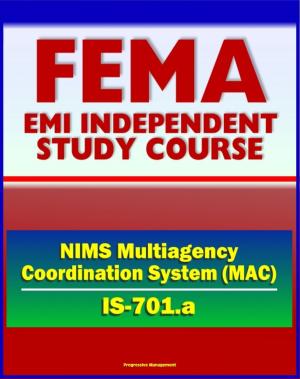Terrorist Attacks on Americans in Benghazi, Libya on September 11, 2012: Report of the State Department Accountability Review Board (ARB), plus House Committee Hearings, Briefings, Statements
Nonfiction, Social & Cultural Studies, Political Science| Author: | Progressive Management | ISBN: | 9781301356089 |
| Publisher: | Progressive Management | Publication: | December 19, 2012 |
| Imprint: | Smashwords Edition | Language: | English |
| Author: | Progressive Management |
| ISBN: | 9781301356089 |
| Publisher: | Progressive Management |
| Publication: | December 19, 2012 |
| Imprint: | Smashwords Edition |
| Language: | English |
This unique ebook provides a comprehensive guide to the terrorist attacks against American government facilities and personnel in Benghazi, Libya on September 11, 2012; the attacks killed four Americans, including the U.S. Ambassador to Libya, John Christopher Stevens. The long-awaited State Department report from the Accountability Review Board (ARB), issued on December 18th, is included, along with the transmittal letter from Secretary of State Hillary Rodham Clinton.
Additionally, there is material from the October 10th hearing of the House Oversight Committee on the security failures of Benghazi, including a statement by Eric Allan Nordstrom, Regional Security Officer, Tripoli, Libya from September 21, 2011 - July 26, 2012.
Finally, it includes a thorough collection of statements and press briefings from the State Department from the announcement of the attack through the period up to the release of the ARB report.
The ARB report states:
The Benghazi attacks represented the first murder of a U.S. ambassador since 1988, and took place 11 years to the day after the terrorist attacks of September 11, 2001. Ambassador Stevens personified the U.S. commitment to a free and democratic Libya. His knowledge of Arabic, his ability to move in all sectors of the population, and his wide circle of friends, particularly in Benghazi, marked him as an exceptional practitioner of modern diplomacy. The U.S. Special Mission in Benghazi, established in November 2011, was the successor to his highly successful endeavor as Special Envoy to the rebel-led government that eventually toppled Muammar Qaddafi in fall 2011. The Special Mission bolstered U.S. support for Libya's democratic transition through engagement with eastern Libya, the birthplace of the revolt against Qaddafi and a regional power center.
The Benghazi attacks took place against a backdrop of significantly increased demands on U.S. diplomats to be present in the world's most dangerous places to advance American interests and connect with populations beyond capitals, and beyond host governments' reach. With State Department civilians at the forefront of U.S. efforts to stabilize and build capacity in Iraq, as the U.S. military draws down in Afghanistan, and with security threats growing in volatile environments where the U.S. military is not present - from Peshawar to Bamako -the Bureau of Diplomatic Security (DS) is being stretched to the limit as never before. DS overall has done a fine job protecting thousands of employees in some 273 U.S. diplomatic missions around the world. No diplomatic presence is without risk, given past attempts by terrorists to pursue U.S. targets worldwide. And the total elimination of risk is a non-starter for U.S. diplomacy, given the need for the U.S. government to be present in places where stability and security are often most profoundly lacking and host government support is sometimes minimal to nonexistent.
The Benghazi attacks also took place in a context in which the global terrorism threat as most often represented by al Qaeda (AQ) is fragmenting and increasingly devolving to local affiliates and other actors who share many of AQ's aims, including violent anti-Americanism, without necessarily being organized or operated under direct AQ command and control. This growing, diffuse range of terrorist and hostile actors poses an additional challenge to American security officers, diplomats, development professionals and decision-makers seeking to mitigate risk and remain active in high threat environments without resorting to an unacceptable total fortress and stay-at-home approach to U.S. diplomacy.
This unique ebook provides a comprehensive guide to the terrorist attacks against American government facilities and personnel in Benghazi, Libya on September 11, 2012; the attacks killed four Americans, including the U.S. Ambassador to Libya, John Christopher Stevens. The long-awaited State Department report from the Accountability Review Board (ARB), issued on December 18th, is included, along with the transmittal letter from Secretary of State Hillary Rodham Clinton.
Additionally, there is material from the October 10th hearing of the House Oversight Committee on the security failures of Benghazi, including a statement by Eric Allan Nordstrom, Regional Security Officer, Tripoli, Libya from September 21, 2011 - July 26, 2012.
Finally, it includes a thorough collection of statements and press briefings from the State Department from the announcement of the attack through the period up to the release of the ARB report.
The ARB report states:
The Benghazi attacks represented the first murder of a U.S. ambassador since 1988, and took place 11 years to the day after the terrorist attacks of September 11, 2001. Ambassador Stevens personified the U.S. commitment to a free and democratic Libya. His knowledge of Arabic, his ability to move in all sectors of the population, and his wide circle of friends, particularly in Benghazi, marked him as an exceptional practitioner of modern diplomacy. The U.S. Special Mission in Benghazi, established in November 2011, was the successor to his highly successful endeavor as Special Envoy to the rebel-led government that eventually toppled Muammar Qaddafi in fall 2011. The Special Mission bolstered U.S. support for Libya's democratic transition through engagement with eastern Libya, the birthplace of the revolt against Qaddafi and a regional power center.
The Benghazi attacks took place against a backdrop of significantly increased demands on U.S. diplomats to be present in the world's most dangerous places to advance American interests and connect with populations beyond capitals, and beyond host governments' reach. With State Department civilians at the forefront of U.S. efforts to stabilize and build capacity in Iraq, as the U.S. military draws down in Afghanistan, and with security threats growing in volatile environments where the U.S. military is not present - from Peshawar to Bamako -the Bureau of Diplomatic Security (DS) is being stretched to the limit as never before. DS overall has done a fine job protecting thousands of employees in some 273 U.S. diplomatic missions around the world. No diplomatic presence is without risk, given past attempts by terrorists to pursue U.S. targets worldwide. And the total elimination of risk is a non-starter for U.S. diplomacy, given the need for the U.S. government to be present in places where stability and security are often most profoundly lacking and host government support is sometimes minimal to nonexistent.
The Benghazi attacks also took place in a context in which the global terrorism threat as most often represented by al Qaeda (AQ) is fragmenting and increasingly devolving to local affiliates and other actors who share many of AQ's aims, including violent anti-Americanism, without necessarily being organized or operated under direct AQ command and control. This growing, diffuse range of terrorist and hostile actors poses an additional challenge to American security officers, diplomats, development professionals and decision-makers seeking to mitigate risk and remain active in high threat environments without resorting to an unacceptable total fortress and stay-at-home approach to U.S. diplomacy.















